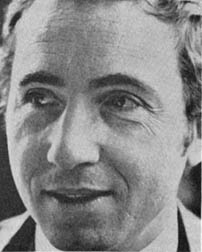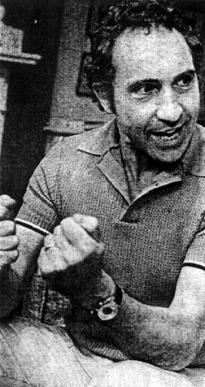












Otherwise Engaged

In Simon Gray's "An Unnatural Pursuit & Other Pieces" (1985 St. Martin's Press), a journal he kept during the writing and production of "The Common Pursuit," he says this about "Otherwise Engaged":
During the early rehearsals of "Otherwise Engaged" Alan Bates and Nigel Hawthorne were physically incapable of getting past a moment when Nigel Hawthorne, playing a minor- public-school teacher, had to step forward and announce aggressively, "I am the latent pederast." Both Alan and Nigel doubled up with laughter again and again. Weeks later, when the same moment arrived before an audience, they were bewildered by its reacting exactly as they once had done. Within a few nights they'd not only come to expect the response, but had incorporated it smoothly into their performances, and might even, if they had been less puritanical performers, have found themselves milking it by prolonging it a little.
- From: The Alan Bates Archive
A special feature in The Alan Bates Archive about this play.
 |
JOHN RUSSELL TAYLOR
IT IS Simon Gray's very special gift to write about intellectuals in such a way that very non-intellectual audiences can understand their thought-processes and enter sympathetically into their dramas. Perhaps this does not seem such a rare thing to do. But while one can think of quite a lot of plays in which we are told that one or more of the characters may be regarded as intellectual�they are academics, philosophers, writers, something of the soft�in practice we might just as well be told they are stock brokers or lavatory attendants for all the difference it makes to our experience of them: being intellectual is something they do off-stage to earn a living, but seems to be left in the wings. What, for instance, do the principal characters in Peter Shaffer's Shflvings ever do or say to convince us that we are witnessing a confrontation in the order of Bertrand Russell at grips with Robert Graves? Precious little, Not only do they not behave in a more intelligent way than the rest of us (that one would hardly expect from an intellectual), but their habits of mind seem equally woolly and undirected.Now at least in Butley and Otherwise Engaged the central characters (and several of the peripheral) function as though exercise of the brain actually means something to them, is a natural way of dealing (as best one can) with the problems of life rather than merely being assumed for special occasions like fancy dress. There is an obvious temptation (especially given the coincidence of principal actor and director in the new play as well as writer) to suggest that Otherwise Engaged is a sort of Son of Bulky, but that is not quite fair and not altogther true. It has elements of truth, but Simon the publisher in Otherwise Engaged is a very different and much more mysterious character. With Butley we can see the form of his escape from his problems� into indiscriminate destructiveness, into the world of nursery rhymes from that of T S Eliot, a deliberate self-lacerating rejection of the values which appear formally to shape his life. Simon clearly has his own form of escape, which is not Butley's; what remains mysterious is whether we should regard him as someone who has achieved a philosophic calm, or one who has declined into the passivity of a dead object.
He is accused at one point of being indifferent 'Indifferent?' be inquires. 'As one might speak of an indifferent win?' (he is very good at wittily pointing out grammatical and other ambiguities in the conversation of his visitors; also, as here, at turning aside wrath by creating a seeming ambiguity where none in fact exists). Towards the beginning of the play he appears to be a very decent sort of chap amiably putting up with a succession of bores and boors and creeps when all he really wants to do is listen to his new recording of Parsif a!; by the end of the play our image of him has changed considerably (though he has changed hardly at all), as we gradually incline to the belief, expressed most explicitly by his wife, that he can put up with all this iust because he hardly notices and what he does notice he does not care about. He is indifferent (not like a wine); he is impregnable (but then, what is there left to penetrate?); he may seem to be otherwise engaged, but in all probability he is merely switched off.
This means that there is a progression of a sort in the play, but not so clear and satisfying as that in Butley. Butley does, after all, get his come-uppance; for the first half of the play he attacks and insults and undemiines everybody with seeming impunity, then in the second half we see them all gradually getting their own back in a series of neatly calculated, cumulative dramatic surprises, The craftsmanship in Otherwise Engaged is just as scrupulous, but the play is built on a series of internal rhymes (the invented suicide in act one; what sounds like a quite real suicide in act two; the carefully balanced reappearance of three of the characters and the matching of the two female characters), and is laid out in terms of an 'and then. . . and then - . -and then' succession of comings and goings. It is the perennial problem of how you can progress when you have a still centre, a character who does not really change from beginning to end.
But is that in fact quite what Mr Gray intends? There seem to be hints that Simon is still, if only just, a suffering human being who is keeping his cool with some difficulty rather than because it just comes naturally to him. The moments when uncontrolled, or hardly controlled, emotion breaks through are odd and unpredictable�and all the more striking for that The moment when the insufferable lad from upstairs comes in wanting to borrow some Nescafe as an aid to seduction, and, failing that, Simon's expensive, cherished coffee-making apparatus, and Simon suddenly becomes�about that, of all things�perceptibly irritated beyond endurance is very strange and true. The moment near the end when his blustering, drunken critic friend accuses him of having blabbed to the police and got him arrested for drunk driving, and he promptly throws his drink in the friend's face demanding just what sort of person he thinks he is, is more clearcut but less easy to define�as played by Alan Bates, and therefore presumably as written, it seems rather a staged, deliberately his- trionic gesture; his mind working again rather than his emotions getting really out of control.
Still, in the final analysis it does not seem to matter very much. Whether in theory the play should work or not, it triumphantly does. Simon is vividly precent as a character, and so are the others �the sadly downtrodden brother, desperately eager for the assistant head mastership of a very minor public school; the loutish critic, with his diatribes against Australian writers taking over the world; he sexy but totally awful girl who tries put the make on Simon in aid of her irthcoming book and gets wittily and t'narguably turned down (though the book may be another matter): and, perhaps above all, the extraordinary man who is handed the central scene of the play, the 'plop' (slang of the old school he and Simon went to, meaning drip) who exacts from Simon an admission that he has on one occasion fooled around with his daughter, shows a surprising degree of prurient interest in the deed, then con-iWsses that it is actually the girl he K nonically lives with and goes into a Complete recital of his ploppisb life, from masturbation (with the youthful Simon, apparently, as his favoured image) to matrimony to monogamy.
This whole scene (the act-break comes right in the middle) is a miracle of progressive dramatic revelation and knife-edge balance between comedy and drama, decorum and disintegration. It is marvellously played by Alan Bates and Benjamin Whitrow, and directed with that nervy precision which seems to be Harold Pinter's forte as a director. But if this sequence is the most spectacular instance of the play's way with its audience. it is symptomatic of the whole�scarcely an actor puts a foot wrong the whole evening, or is for that matter given a chance to by the script and direction. At first it is surprising to hear a regular audience laughing so heartily and continuously at what would seem to be rather rarified jokes, depending often on niceties of grammar and definition. But obviously, as in Butley. it really didn't matter if you had never heard of T S Eliot, so here it doesn't matter if you fail sometimes quite to get the point of what Simon is saying, because you get the meaning of the overall human gesture. Simon Gray's intellectuals are always unmistakably intellectuals, but the games of power and passion that they play are the games we all play, and can all recognise. If we do not altogether understand Simon, and cannot sympathise with him (he would be the last man to wish it) at least, in the theatre and afterwards, we have no doubt at all that he exists.
